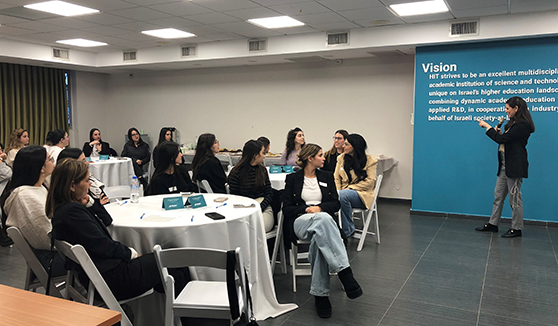More:
M.Design in Design for Technological Environment
M.Des. in Design for
Technological Environment*
Prof. Hanan Kaminski, Head of Master's Program In Design for Technological
Who is the program for?
The program is intended for curious people who “live” technology and “breathe” design and aesthetics. This unique Master's program offers the student an opportunity to meld cutting-edge technology with multidisciplinary, critical tools in an environment which requires people to demonstrate both qualities.
The M.Des. for Technological Environments is open to academics from diverse fields who are interested in applying varied technological approaches to contemporary design; leading development processes’ and integrating innovation into the corporate workplaces and agencies; becoming independent entrepreneurs.
The program's goals and objectives
The program is aimed at training students in strategic design, providing them with the tools required to lead design and development processes, initiate new and innovative technologies into the corporate environment, as well as serve as academic leaders. The program is practical and applied in nature, training the student to have the capabilities to assume design roles which focus on development processes and implementation of innovation, based on the precept that design is a unifying and valuable systemic factor.
The uniqueness of the program
- Study of complex systems: based on the founding principle that a technological environment must be integrative and combine diverse complementary technologies.
- PBL (Project based Learning): utilizing project-based team-driven frameworks, under the supervision of instructors from different fields.
- Connecting to industry: which is HIT’s hallmark, bringing students together with professionals and experts in the latest fields of technology.
- Leading lecturers: drawn from amongst outstanding designers from various fields, scientists, technology experts and theoreticians who, in several of the courses, work jointly in teams.
The curriculum
The program offers an innovative academic approach to the combination of technology and design.
At its core are design labs for a future technological environment and a significant connection to academy – industry partnership.
The students in the program will benefit from exposure to a rich technological world of design deploying algorithms, virtual reality and artificial intelligence (AI). Their toolbox will be expanded and enriched by the elective courses provided, such as service design, transmedia, sensor technologies and more .
| 1st year | 1st semester | 2nd semester | ||
|---|---|---|---|---|
| Compulsory courses | 6 hours | 12 credits | 5 hours | 10 credits |
| Elective courses | 1.5 hours | 3 credits | 1 hours | 2 credits |
| Seminar | - | - | 1.5 hours | 3 credits |
| Total | 7.5 hours | 15 credits | 7.5 hours | 15 credits |
| 2nd year | 1st semester | 2nd semester | ||
|---|---|---|---|---|
| Compulsory courses | 4 hours | 8 credits | 3 hours | 6 credits |
| Elective courses | 1 hours | 2 credits | 1.5 hours | 2 credits |
| Total | 5 hours | 10 credits | 4.5 hours | 9 credits |
The total scope of the program is 24.5 hours 49 credits
The study framework
Study days: 1 full day (Tuesday) and a half day (Friday)
Duration of studies: two years
Starting month: October
Completion courses: to be taught in the spring semester. They will provide an opportunity for candidates less well-versed in design or technology to enhance their skill level and keep pace with their studies.
Admission
Bachelor's degree graduates from a recognized academic institution in the fields of design, art, cinema, exact sciences: (engineering, computer science, biology, neuroscience) and more.
- Bachelor's degree with a final grade of at least 80
- Portfolio of works
- Knowledge of a basic computer language or completion course in same
- Admissions interview
During the admissions interview, the required completion quota (up to 12 credits) will be determined according to the relevance of their undergraduate degree to this master’s degree program.
- Exceptions: Candidates who have a final bachelors grade lower than 80 but not lower than 75 will be able to register for studies with probationary status, and will be required to complete works assigned to them by the Committee, within a period of time determined by it, not to exceed one academic year.
* The awarding of the degree is conditional to the approval of the CHE, as is customary with new programs
- News & Events



